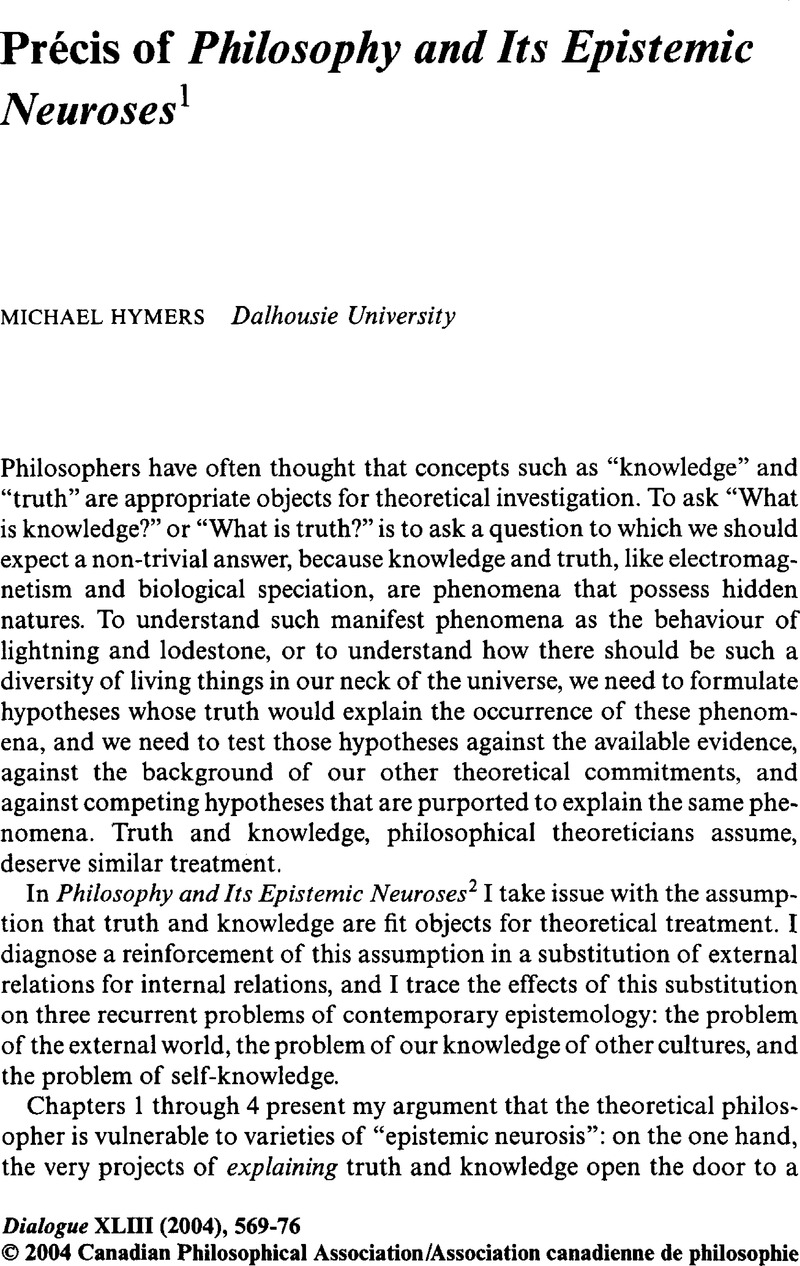No CrossRef data available.
Article contents
Précis of Philosophy and Its Epistemic Neuroses1
Published online by Cambridge University Press: 13 April 2010
Abstract

- Type
- Interventions/Discussions
- Information
- Dialogue: Canadian Philosophical Review / Revue canadienne de philosophie , Volume 43 , Issue 3 , Summer 2004 , pp. 569 - 576
- Copyright
- Copyright © Canadian Philosophical Association 2004
References
Notes
2 Hymers, Michael, Philosophy and Its Epistemic Neuroses (Boulder: Westview Press, 2000).Google Scholar
3 Putnam, Hilary, Reason, Truth and History (Cambridge: Cambridge University Press, 1981), chap. 1.CrossRefGoogle Scholar
4 See Davies, David, “Putnam's Brain-Teaser,” Canadian Journal of Philosophy, 25 (1995): 203–28.CrossRefGoogle Scholar
5 See Devitt, Michael, Designation (New York: Columbia University Press, 1981Google Scholar), and Devitt, Michael, Realism and Truth, 2nd ed. (Princeton, NJ: Princeton University Press, 1997).Google Scholar
6 See Putnam, Reason, Truth and History, chap. 2.
7 Russell, Bertrand, Philosophical Essays, rev. ed. (London: Allen & Unwin, 1966), p. 139.Google Scholar
8 Rorty, Richard, Philosophy and the Mirror of Nature (Princeton, NJ: Princeton University Press, 1979), p. 193.Google Scholar
9 See, e.g., Wittgenstein, Ludwig, Philosophical Investigations, 3rd ed., edited by Anscombe, G. E. M. and Rhees, R., translated by Anscombe, G. E. M. (Oxford: Basil Blackwell, 1968)Google Scholar; Wittgenstein, Ludwig, Philosophical Grammar, edited by Rhees, R., translated by Kenny, A. (Oxford: Basil Blackwell, 1974)Google Scholar; and Wittgenstein, Ludwig, Philosophical Remarks, edited by Rhees, R., translated by Hargreaves, R. and White, R. (Chicago: University of Chicago Press, 1975).Google Scholar
10 See, e.g., Quine, W. V., “Two Dogmas of Empiricism,” in From a Logical Point of View, 2nd ed. (Cambridge, MA: Harvard University Press, 1980), pp. 20–46.Google Scholar
11 Cf. Williams, Michael, Unnatural Doubts (Princeton, NJ: Princeton University Press, 1996)Google Scholar. Williams argues that knowledge is not a natural kind and entertains, but does not endorse the idea that knowledge is an artifact.
12 Rorty, Richard, Objectivity, Relativism and Truth (Cambridge: Cambridge University Press, 1991), p. 138.Google Scholar
13 Davidson, Donald, “On the Very Idea of a Conceptual Scheme,” in Inquiries into Truth and Interpretation (Oxford: Clarendon, 1984), pp. 183–98.Google Scholar
14 Rorty, Richard, Consequences of Pragmatism (Minneapolis, MN: University of Minnesota Press, 1982), p. 166.Google Scholar
15 See, e.g., Burge, Tyler, “Cartesian Error and the Objectivity of Perception,” in Subject, Thought, and Context, edited by Pettit, P. and McDowell, J. (Oxford: Clarendon, 1986), pp. 117–36Google Scholar, and Burge, Tyler, “Individualism and Self- Knowledge,” Journal of Philosophy, 85 (1988): 649–63.CrossRefGoogle Scholar
16 See e.g., Davidson, Donald, “First Person Authority,” Dialectica, 38 (1984): 101–111CrossRefGoogle Scholar, and Davidson, Donald, “Knowing One's Own Mind,” in Proceedings and Addresses of the American Philosophical Association, 60 (1987): 441–58.CrossRefGoogle Scholar
17 See, e.g., Lugones, Maria C., “Structure/Antistructure and Agency under Oppression,” Journal of Philosophy, 87 (1990): 500–507.CrossRefGoogle Scholar


